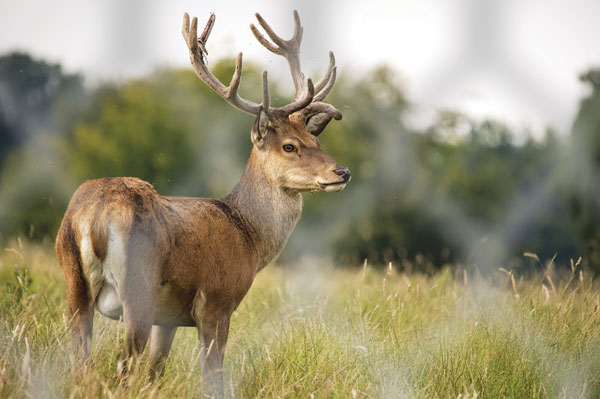Mo Farm Bill Support Not Enough To Override Veto

UPDATE: The legislature voted at 11:55pm on Wednesday night; the Governor’s veto stands.
Jefferson City is a strange place these days. Literally, things can turn upside down overnight. That’s been the case with House Bill 1326 and Senate Bill 506.
The bills, deemed the Mo Farm Bills, are supported by both the Missouri Cattle Producers and Missouri’s Dairy Cattle industry. They were designed to strengthen Missouri’s agricultural industry, which pretty much everyone agreed was a good thing. Just over two months ago these bills were also heavily supported in the state capitol.

“It is unfortunate that the legislature insisted on amending this unconstitutional provision to two pieces of legislation that otherwise contain worthy provisions advancing Missouri agriculture”
Governor Jay Nixon
The contentious part of the bill is that it addresses issues concerning Missouri’s white-tailed deer population on deer farms which are produced for purposes of hunting. The deer farmers claim their farms are completely contained with high-fences to prevent cross-contamination between wild and captive deer. After the Mo Farm Bills were introduced, cleared through committee and perfected, the captive cervids portions were added to each bill prior to the legislative vote.
In June, MCA President Jim McCann wrote in favor of the captive deer provision, writing, “MCA supports the actions of the Missouri Deer Association in not only classifying captive cervids as livestock, but also to allow regulation of the captive cervid industry to fall under the care of the Missouri Department of Agriculture. The Missouri Department of Agriculture already regulates the domestic elk population.” He added the MCA believes the inclusion of captive white-tailed deer wouldn’t negatively impact the wild deer population in Missouri.
Governor Nixon did not support the bill, in fact, he vetoed it. In a July 8th letter to the Secretary of State, he outlined his reasons for the veto.
House Committee Substitute for Senate Bill 506 would redefine the term ‘livestock’ to include ‘captive cervids’, which are members of the deer family, including white-tailed deer. These changes would eliminate the role of the Missouri Department of Conservation in regulating white-tailed deer. Because doing so would be at odds with the longstanding successful conservation practices and would violate the Missouri Constitution, this legislation does not receive my approval.
Nixon solely blamed the late addition of captive cervid to the bills for his veto stating, “it is unfortunate that the legislature insisted on amending this unconstitutional provision to two pieces of legislation that otherwise contain worthy provisions advancing Missouri agriculture.”
Nixon restated the role the Missouri Conservation Department has had in restoring the state’s population of white-tailed deer.
“Growing and managing our deer herd and fostering the hunting opportunities that we enjoy takes hard work and sound science, and the Department of Conservation should be commended for employing both to preserve this important part of our heritage, not stripped of its authority to do so in order to protect narrow interests,” wrote Nixon.

“I’ve heard overwhelmingly from my district that they are concerned about this health issue with the deer. I think we need further study on this issue. Right now I will vote on the side of caution.”
Rep. Donna Lichtenegger
“I filed Senate Bill 506 on December 1, 2013,” wrote Munzlinger. “As the legislative session progressed, key agricultural measures were added in the Missouri Senate and House of Representatives. When the session ended on May 16, 2014, SB 506 and HB 1326 were almost identical and served as the major agriculture bills for the year. This is one of the most comprehensive agriculture bills passed in recent years and I fully support it.”
He further stipulated his support for the captive deer portion of the bill. “Cervids are hoofed mammals characterized by the males having antlers. White-tailed deer, elk, and many other deer species are members of the cervid family. The classification of deer as livestock would transfer the regulation of captive deer owners and breeders from the Department of Conservation to the Department of Agriculture. It would also allow Missouri meat processors to market and sell venison harvested from captive herds year round,” wrote Munzlinger.
Munzlinger added that in 1995, Senate Bill 109 was passed and signed into law classifying elk as livestock, provided they are obtained from a legal source and not wild. He believes the white-tailed deer issue fits into this same mold. “I will work to overturn this veto and maintain my support for all of these measures that are so important to Missouri agriculture and to the citizens and property owners of our state,” Munzlinger wrote.
“When deer are handled like cattle, there are checks,” explained Joe Humphrey, a Poplar Bluff rancher who has a fenced hunting farm. “Basically if deer are moved from one state to another, like cattle, they must go through health checks. State agriculture departments have to give their approval in order for deer to be moved.”
“Our deer are born and die in captivity,” explained Humphrey. “That is exactly where health problems can be caught. Where it is difficult to realize those problems in a timely manner is in the wild.” He insists the Conservation Department is not equipped to deal with captive deer. He said the USDA actually recognizes these deer as livestock and treats them as livestock. “The Ag Department provides a much more secure system of checks and balances for deer farmers,” Humphrey said.
Most legislators in Southeast Missouri voted for the bill back in May including Republican Steve Cookson, 153rd District; Republican Kent Hampton, 150th District; Republican Donna Lichtenegger, 146th District; Todd Richardson, 152nd District; and Republican Kathy Swan, 147th District.
Just a few days ago, there was a strong move to override the governor’s veto. Now, that support seems to be crumbling. Cookson and Richardson are on the fence. Lichtenegger said she will not support the override.

“I’m still on the fence. About half the land in my district is owned by the state or federal government. And in my district, deer hunting is like a religion. So when something affects deer hunting, it gets a lot of interest.”
Rep. Steve Cookson
- Enact the Missouri Dairy Revitalization Act (MDRA), which is an innovative program that dovetails in with the new Dairy Title of the Farm Bill;
- Increase the hauling limits for livestock on Missouri highways;
- Extend the equine liability waiver to all livestock;
- Modify provisions relating to evidence of financial responsibility for certified commercial pesticide applicators;
- Clarify the process for insuring title transfers of farm and ranch property;
- Enable Missouri cattle producers the opportunity to vote whether or not to increase their investment in the Missouri beef check off;
- Continue the large animal veterinarian student loan program; and
- Classify “captive cervids” as livestock.
Twenty-one Missouri farming groups are still urging the legislature to over-ride the governor’s veto on the measure.
Donna Lichtenegger of Jackson said that originally she was supportive of the measure, but now will not support the veto override because of the deer section of the bill.
“I’ve heard overwhelmingly from my district that they are concerned about this health issue with the deer,” said Lichtenegger. “I think we need further study on this issue. Right now I will vote on the side of caution.”
Todd Richardson said, “Obviously there are stake holders on both sides of this issue.” He said he will be involved in caucus meetings up until the time of the vote to decide how to proceed on the issue. “This is an important issue for agriculture. But on the flip side we’ve got the captive deer population concerns as well.” Richardson is hoping two days of caucus meetings will help educate legislators so that they make the right decision on the issue.
Cookson also initially voted for the measure, but said he too is on the fence about which way to vote in the override. “I’m keeping an open mind at this point,” said Cookson. He said that as soon as his vote was cast in the initial vote, his phone started ringing.
“About half the land in my district is owned by the state or federal government,” explained Cookson. “And in my district, deer hunting is like a religion. So when something affects deer hunting, it gets a lot of interest.”
He said people are concerned about anything that could harm the wild deer population. “We have families in my district who pretty much depend on deer meat to get through the winter,” said Cookson. “This is a question of who is to manage the deer population, the Agriculture Department or the Conservation Department,” he continued.
“Most people in this area do not have the opportunity to hunt on these captive deer ranches,” Cookson said, adding that these ranches’ clients basically pay big dollars for hunting on them with a virtual guarantee that they will be able to kill a trophy deer.
Officially, Cookson said he has not yet decided how he will vote. “I’ll be talking to more people and trying to gather more information before I vote,” he said. “The amendment concerning the captive deer came up on the ag bill without much time for research. I really didn’t get a chance to learn much about it before I had to vote,” said the legislator.
Aaron Jeffries of the Missouri Department of Conservation said the unfortunate part of this issue is that the agriculture bill has mostly very good content that would be helpful to Missouri’s agricultural community and the state’s economy. “Unfortunately this captive deer segment was put into it, and because of that, we are hoping the governor’s veto will be sustained,” said Jeffries.
“In our eyes, deer is wildlife, whether captive or not,” said the conservationist.
The captive deer industry in North America is over a billion dollar industry, and currently involves about 10,000 farms and hunting Preserves. Jeffries said it is that industry that is pushing for the change for the captive deer to be overseen by the Agriculture Department. Missouri’s deer hunting industry is also a one billion dollar per year industry and incorporates 12,000 jobs.
Mike Deering, executive vice president of the Missouri Cattlemen’s Associaton, said he is still hopeful that the override of Nixon’s veto on the agriculture bill will be successful.
“We are pushing hard, but it is extremely challenging,” said Deering. He noted that his group only has one lobbyist working the issue, but that his group also has a very strong grassroots effort concentrated on the effort.
“The Cattlemen will be there in force,” said Deering, “and we feel that presence is more powerful than a hired gun.” He added that he feels most of the state’s legislators understand the importance of agriculture to Missouri’s heritage and economy, and he is hoping they will remember that importance when they cast their votes.
Though both sides claim to have scientific research supporting their positions, it is unclear on this issue how much is science, and how much is emotion, and how much is just politics.
Whether the veto is overridden or sustained, the issue is likely not dead.

more Big Government regulations….elect more liberals